Select Language

SANTIAGO (Reuters) - Chile's economic activity index posted its largest year-on-year increase in almost two years in February, central bank data showed on Monday, reinforcing its positive momentum after a major beat in the previous month.
Economic activity in the world's largest copper producer was up 4.5% in February from a year earlier, the central bank said, the most since May 2022, when it had risen 5.1%.
All activities surveyed by the monetary authority had a positive performance in the month, with mining and services - especially transportation - among the highlights.
A number of independent analysts had already pointed out last week that economic activity growth of more than 4% in February was on the cards after sectoral statistics confirmed a good start to the year for the Andean country.
The result, however, still came in as a surprise for analysts polled by the central bank, whose median forecast for activity in February stood at a 1.5% expansion, according to a poll released last month.
The data comes after Chile's economic activity rose by a revised 2.3% year-on-year in January, overshooting market estimates.
The Monthly Economic Activity Indicator (Imacec), which represents about 90% of gross domestic product (GDP), was also up 0.8% in February from the previous month.
"In all, the momentum of both ex-mining and mining activity has clearly outpaced our expectations," JPMorgan economist Diego Pereira said, noting that accommodative fiscal policy and less restrictive monetary policy have provided a boost.
"The question is whether mining would be able to consolidate this level, gain further, or drop in a similar manner to what happened in the prior two years."
Chile faced a sharp economic downturn in 2023 after a rapid post-pandemic recovery. The economy struggled while consumer prices soared, leading the central bank to hike interest rates which it has now been cutting as inflation cooled.
The latest rate cut came in January, when the bank reduced borrowing costs by 100 basis points. The monetary authority's rate-setting committee will meet again this week and is expected to deliver a 75-basis-point rate cut to 6.50%.

By Florence Tan
SINGAPORE (Reuters) -Oil prices rose on Monday, adding to recent gains amid expectations of tighter supply from OPEC+ cuts, attacks on Russian refineries and as upbeat Chinese manufacturing data supported outlooks for improving demand.
Brent crude rose 24 cents, or 0.3%, to $87.24 a barrel by 0649 GMT after rising 2.4% last week. U.S. West Texas Intermediate crude was at $83.45 a barrel, up 28 cents, or 0.3%, following a 3.2% gain last week.
Trade volumes are expected to be thin on Monday as several countries are closed for Easter holidays.
Both benchmarks finished higher for a third consecutive month in March, with Brent holding above $85 a barrel since the middle of last month, as the Organization of the Petroleum Exporting Countries (OPEC) and their allies, a group known as OPEC+, pledged to extend production cuts to the end of June which could tighten crude supply during summer in the Northern Hemisphere.
Russian Deputy Prime Minister Alexander Novak said on Friday that its oil companies will focus on reducing output rather than exports in the second quarter in order to evenly spread production cuts with other OPEC+ member countries.
Drone attacks from Ukraine have knocked out several Russian refineries, which is expected to reduce Russia's fuel exports.
"Geopolitical risks to crude and heavy feedstock supplies add to strong Q2 24 demand fundamentals," Energy Aspects analysts said in a note.
Almost 1 million barrels per day (bpd) of Russian crude processing capacity is offline from the attacks, impacting its high-sulphur fuel oil exports which are processed at Chinese and Indian refineries, the consultancy added.
In Europe, oil demand was firmer than expected, rising 100,000 bpd on year in February, Goldman Sachs analysts said, versus its forecast of a 200,000 bpd contraction in 2024.
Europe's firm demand, softness in U.S. supply growth coupled with a possible extension of OPEC+ cuts through 2024 outweigh downside risk from persistent softness in China's demand, they said in a note.
Crude oil production by the United States, the world's largest producer, dropped 6% in January from December's record high, following freezing weather, data from the Energy Information Administration showed on Friday.
"We see the risks to our forecast that Brent will average $83/bbl in 2024Q4 as skewed moderately to the upside," the analysts said.
Also supportive for prices, China's manufacturing activity expanded for the first time in six months in March, an official factory survey showed on Sunday, supporting oil demand at the world's largest crude importer, even as a crisis in the property sector remains a drag on the economy.
Investors are also scouring U.S. economic data for signs of when the Federal Reserve will cut interest rates this year which will support the global economy and oil demand.
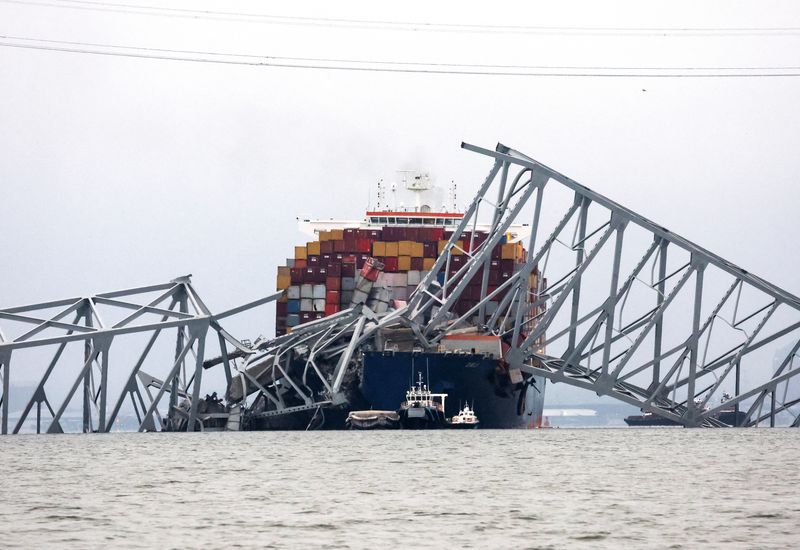
By Gabriella Borter
WASHINGTON (Reuters) -With efforts underway to clean up thousands of tons of steel debris from the collapsed bridge in Baltimore's harbor, Maryland Governor Wes Moore on Sunday urged Republicans to work with Democrats to approve the federal funding needed for rebuilding the bridge and to get the port economy back on its feet.
Baltimore's Francis Scott Key bridge collapsed early on Tuesday morning, killing six road workers, when a container ship nearly the size of the Eiffel Tower lost power and crashed into a support pylon. Much of the span crashed into the Patapsco River, blocking the Port of Baltimore's shipping channel.
The Biden administration released $60 million in initial emergency aid on Thursday to assist in cleaning up the bridge debris and reopening the port, which is the largest in the U.S. for "roll-on, roll-off" vehicle imports and exports of farm and construction equipment. The port has been closed since Tuesday, leaving in limbo the jobs of some 15,000 people who rely on its daily operations.
Federal officials have told Maryland lawmakers the final cost of rebuilding the bridge could soar to at least $2 billion, Roll Call reported, citing a source familiar with the discussions.
Democratic President Joe Biden has pledged that the federal government will cover the cost, but that will depend on passage of legislation authorizing the funds by both the Republican-led House of Representatives and Democratic-led Senate. The divided Congress has been repeatedly riven by partisan battles over funding, with hardline Republicans often at odds even with members of their own party.
Moore, a Democrat, said Republicans should be willing to approve the funding for the sake of not just the city of Baltimore, but for the national economy.
"The reason that we need people to move in a bipartisan basis ... is not because we need you to do Maryland a favor," Moore told CNN on Sunday. "We need to make sure that we're actually moving quickly to get the American economy going again, because the Port of Baltimore is instrumental in our larger economic growth."
Secretary of Transportation Pete Buttigieg expressed optimism on Sunday that Congress would approve the funds necessary for the cleanup and rebuild, noting that the divided legislative body had passed Biden's $1 trillion infrastructure package in 2021.
"If there's anything left in this country that is more bipartisan than infrastructure, it should be emergency response. This is both, and I hope that Congress will be willing if and when we turn to them," Buttigieg told CBS's "Face the Nation."
Biden was expected to visit the bridge collapse site this week.
An enormous crane began cutting up portions of the collapsed bridge to prepare them for removal on Saturday, which officials said was the first step of what will be a long and complicated cleanup. A spokesperson for the governor's office said on Sunday that a 200-ton (180-metric ton) piece of the bridge had been removed and officials were working to determine the best strategy for pulling the ship off the wreckage.
Later Sunday officials said they were preparing to establish an alternate route for "commercially essential vessels," although few additional details were released and the timing of the alternate route's opening wasn't made clear.
In a statement, coordinator Capt. David O'Connell said that the alternate would "support the flow of marine traffic into Baltimore." Video released by responders showed Coast Guard officials dropping buoys into the water near the site of the collision.
The wreckage and hazardous weather conditions have made it impossible for divers to continue searching for the four remaining bodies of the deceased construction workers in recent days, Moore said.
Moore and other officials have declined to give an estimated timeline for the reopening of the port and the rebuilding of the bridge.

BANGKOK (Reuters) - Thailand's economic growth is expected at 2.8% this year before accelerating to 3.0% in 2025, the World Bank said on Monday.
The growth outlook for 2024 and 2025 was reduced from 3.2% and 3.1% respectively, as forecast in December. Southeast Asia's second-largest economy expanded 1.9% in 2023.
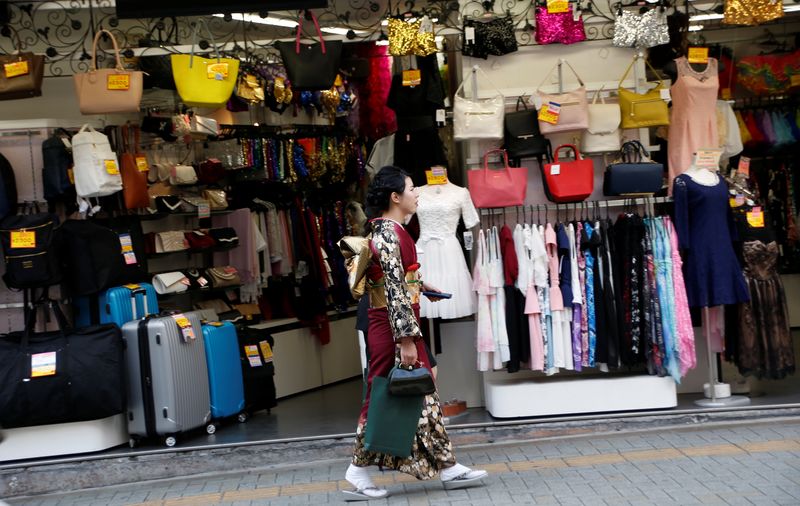
Japan's service sector sentiment rises to highest in over three decades
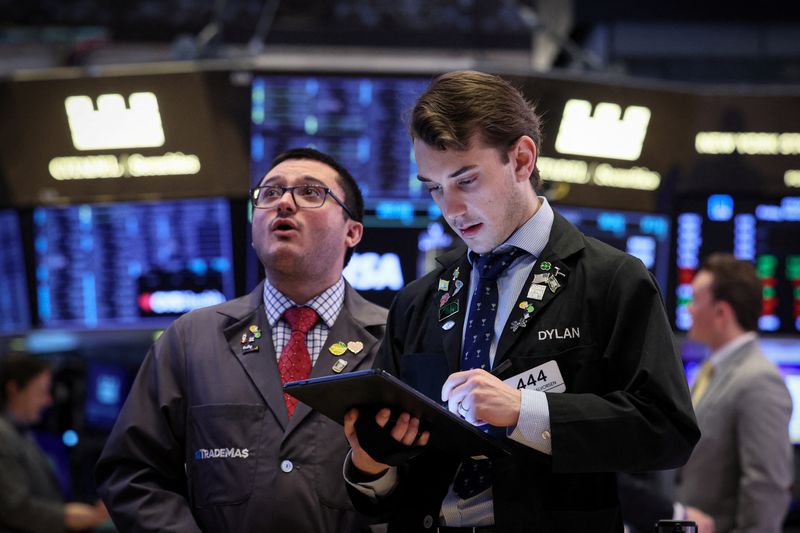
Investing.com -- U.S. employment data on Friday will be the main highlight of this week’s economic calendar amid hopes the economy is on course for a soft landing. The second quarter gets underway after a stellar performance for stocks in Q1. The yen and the yuan remain on intervention watch while data out of the Eurozone and China will be closely watched. Here’s what you need to know to start your week.
Nonfarm payrolls
Friday’s jobs report will be in the spotlight amid investor confidence that the economy is set for a "soft landing", in which inflation moderates but the economy avoids a severe downturn.
The U.S. economy is expected to have added 205,000 jobs in March, slowing from the 275,000 jobs added in February.
Hopes for a "soft landing" for the economy were boosted after the Fed at its March meeting stuck to its view of three rate cuts this year while upgrading its outlook for economic growth.
Ahead of the jobs data, investors will also get a chance to hear from several Fed officials including Fed Chair Jerome Powell on Wednesday. Among others due to make appearances are New York Fed President John Williams, San Francisco Fed head Mary Daly and Richmond Fed head Thomas Barkin.
Q2 kicks off
The U.S. stock market has had a strong start to the year, boosted by optimism over artificial intelligence related stocks and expectations the Fed will begin to cut interest rates this year.
Each of the three main U.S. indexes recorded solid quarterly gains, led by a climb of over 10% for the S&P 500 for its biggest first-quarter gain since 2019.
Whether that rally continues into the second quarter is largely down to the Fed. At the start of the year markets had been expecting six rate cuts from the Fed – now just three are priced in and officials have not yet signalled that inflation has come down enough to justify a rate cut.
Continued strong momentum will also depend on corporate earnings which get underway in earnest the second week in April.
Intervention watch
Monetary authorities in Japan and China are on high alert as their currencies weaken past levels that they've been defending for months, largely thanks to the strong dollar.
With the yen faltering towards the 152 per dollar level and the yuan struggling to break above the stronger side of 7.2 per dollar, officials have stepped up efforts to bolster their currencies.
In Japan, that means verbal warnings, while in China it has been state banks buying yuan and selling dollars.
Given how much the two big Asian currencies have fallen, there's a growing school of thought that Beijing could have grown more tolerant of a weak yuan to maintain its competitive edge against the yen but it’s hard to say what’s next.
Eurozone inflation
The Eurozone is to release flash inflation data for March on Wednesday that will be closely watched amid speculation that the European Central Bank is gearing up to cut rates in June.
Inflation in the euro area remained high since the start of the year and needs to fall further to allow the ECB to deliver a summer rate cut, making the next three inflation reports key for markets (and the ECB).
If inflation surprises to the upside, rate cut bets will be pushed out.
Speaking Saturday, ECB Governing Council member Robert Holzmann said it could lower its key interest rate before the Fed, noting that the European economy was growing more slowly than its U.S. counterpart.
China data
China's manufacturing activity expanded for the first time in six months in March, according to official data published on Sunday, offering relief to policymakers even as a crisis in the property sector remains a drag on the economy and confidence.
Expectations are for Monday’s Caixin manufacturing PMI to show a slight expansion, likely continuing its divergence with the official reading - overall offering a mixed outlook for the world's No.2 economy.
Policymakers have wrestled with persistent economic sluggishness since the abandonment of COVID curbs in late 2022, amid a deepening housing crisis, mounting local government debts and weakening global demand.
(Reuters contributed reporting)
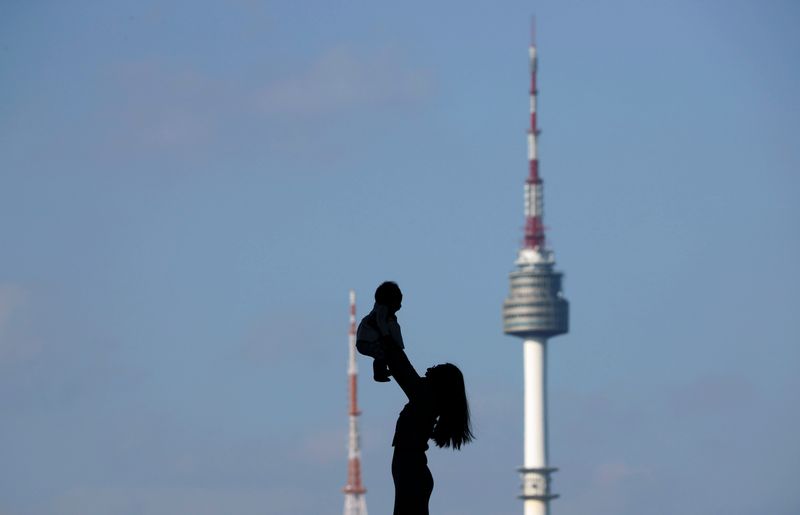
By Cynthia Kim and Jihoon Lee
SEOUL (Reuters) - South Korea is launching a high-speed train service that will reduce the travel time between central Seoul and its outskirts, a project officials hope will encourage more youth to consider homes outside the city, and start having babies.
South Korea has the world's lowest fertility rate, and its youth have often cited long commutes and cramped, expensive housing in greater Seoul, home to about half the population, as the main reasons for not getting married and starting a family.
The birth rate in Seoul is even lower than the national average, and the government has tried to boost the number of newborns through subsidies, with little success.
Officials are now pinning their hopes on the Great Train eXpress (GTX), a 134 trillion won ($99.5 billion) underground speedtrain project that, by 2035, will provide six lines linking Seoul to several outlying areas.
On Friday, President Yoon Suk Yeol inaugurated a section of the first line, which will cut the commute time from Suseo in capital to the satellite city of Dongtan to 19 minutes from 80 minutes now on a bus.
The shorter commute "will enable people to spend more time with their family in the mornings and evenings," he added.
The line is due to go into service on Saturday, and once fully operational, the GTX will be one of the fastest underground systems in the world, with trains travelling at speeds of up to 180 km per hour (112 mph), officials said.
Owning a home in South Korea is costly, with median prices hitting a peak in June 2021 after rising 45% over five years. Seoul is particularly expensive, offering some of the worst value for money per square foot of any advanced economy, analysts say.
Land Minister Park Sang-woo told Reuters the GTX would allow young people to consider homes far away from the capital without having to spend hours commuting. The time they get back can go towards their families, he added.
"With two-hour commute on the way home, for example, how can anyone make time for babies? The idea is to give people more leisure time after work," he said.
Some analysts, however, said the GTX could contribute to the decline of rural South Korea, by sucking more people into the already overcrowded capital.
"To revive regional towns facing extinction, the most important thing is to equip other areas with a similar kind of public infrastructure too," said Kim Jin-yoo, professor of Urban Planning & Transportation Engineering at Kyonggi University.

WASHINGTON (Reuters) - The United States will partner with Mexico to explore semiconductor supply chain opportunities, the State Department said on Thursday, as the Biden administration pushes to reduce reliance on China and Taiwan for the technology.
The collaboration will take place as part of the U.S. CHIPS Act, a 2022 law that created a $500 million fund for developing the semiconductor supply chain through initiatives with allies and partners.
"Manufacturing of essential products ranging from vehicles to medical devices relies on the strength and resilience of the semiconductor supply chain," the department said in a statement.
The partnership will begin with an assessment of Mexico's existing semiconductor industry, regulatory framework and workforce needs, the department added.
Mexico's economic ministry did not immediately respond to a request for comment on the State Department's announcement.
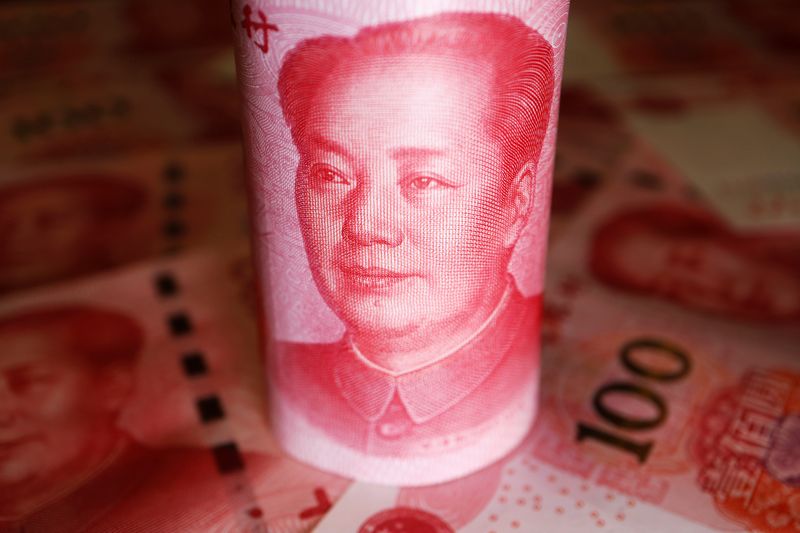
BOAO, China, (Reuters) - China will make it easier to move capital in and out of the country and promote financial market deregulation, a senior forex regulator said on Friday, as Beijing seeks to woo foreign investors amid heightened geopolitical tensions.
"We will steadily push forward two-way capital market opening, and strengthen the connectivity between domestic and overseas financial markets," Xu Zhibin, deputy head of the State Administration of Foreign Exchange (SAFE), said at the annual Boao forum for Asia.
"We will expand the variety and scope of investments to attract more investors to invest in China's financial markets."
Xu also vowed to support high-quality Chinese companies to sell shares and bonds in overseas markets, and encourage sovereign wealth funds and other institutional investors to invest offshore "in an orderly manner."
Many global investors have left, or diversified away from China over the past few years, amid concerns over China's economic health, policy orientations, and Sino-U.S. tensions.
Meanwhile, overseas listings by Chinese companies have slumped, thanks to tighter scrutiny over national and data security by both Chinese and Western governments.

By Leika Kihara
TOKYO (Reuters) -Core inflation in Japan's capital slowed in March and factory output unexpectedly slid in the previous month, heightening uncertainty on how soon the Bank of Japan can raise interest rates again after exiting its radical monetary stimulus.
Core consumer price index (CPI) in Tokyo, an early indicator of nationwide figures, rose 2.4% in March from a year earlier, matching a median market forecast and slowing slightly from a 2.5% gain in February.
A separate index that excludes the effect of both fresh food and fuel costs, viewed as a broader price trend indicator, also showed inflation slowing to 2.9% in March from 3.1% in February, data showed on Friday.
While core inflation is still above the central bank's 2% target, the slowdown underscores how price pressures in Japan are still predominantly coming from raw material costs rather than robust domestic demand.
Separate data showed on Friday Japan's factory output unexpectedly fell by 0.1% in February from the previous month, against a median market forecast for a 1.4% rise.
Manufacturers surveyed by the Ministry of Economy, Trade and Industry expect seasonally adjusted output to increase 4.9% in March and rise 3.3% in April, the data showed.
The data may point to caution at the BOJ in implementing further interest rate hikes, after ending an eight-year negative interest rate policy last week.
The BOJ has said its decision to end negative rates last week was driven by signs that robust demand and the prospect of higher wages were prodding firms to keep hiking prices for both goods and services.
BOJ Governor Kazuo Ueda has said the central bank could hike rates again if inflation overshoots expectations or upside risks to the price outlook heighten significantly.
Big firms have offered bumper pay hikes in this year's annual wage negotiations, heightening the prospect that Japan will see inflation sustained around the BOJ's 2% target.
But consumption has showed signs of weakness as rising living costs hit households, casting doubt on the strength of Japan's economy.
Factory output also remains weak due to production and shipment disruption at Toyota Motor (NYSE:TM) and its small-car unit, which could weigh on the broader economy due to their huge presence in Japan's manufacturing sector.
Japan's economy expanded an annualised 0.4% in the final quarter of last year, narrowly averting a technical recession as robust capital expenditure offset weaknesses in consumption.

